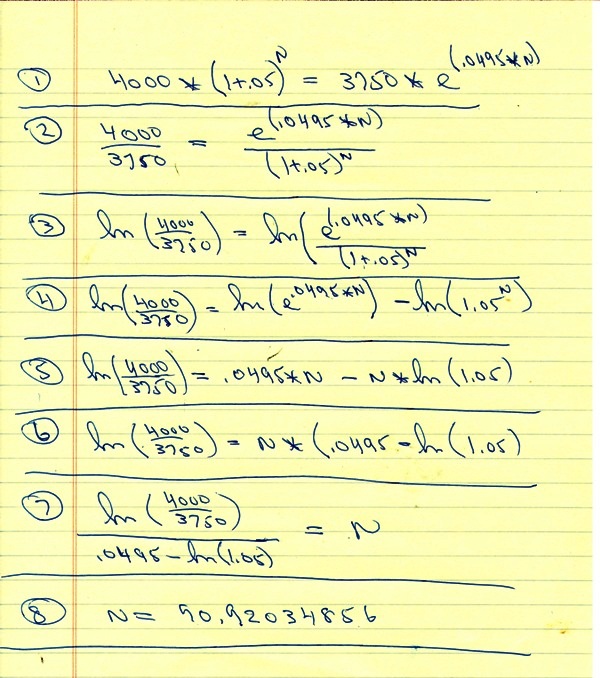f is the future value.
p is the present value.
r is the interest rate per time period.
n is the number of time periods.
that's the formula for discrete compounding.
the formula for continuous compounding is f = p * e ^ (r * n)
f is the future value.
p is the present value.
e is the scientific constant equal to 2.718281828.....
it is shown as the e ^ x key on your calculator.
r is the interest rate per time period.
n is the number of time periods.
their balance will be the same when the future value of their respective accounts are equal to each other.
this occurs when p * (1 + r) ^ n is equal to p * e ^ (r * n)
given your inputs, the formulas become:
4000 * (1 + .05) ^ n = 3750 * e ^ (.0495 * n)
divide both sides of this equation by 3750 to get:
4000 / 3750 * (1 + .05) ^ n = e ^ (.0495 * n)
divide both sides of this equation by (1 + .05) ^ n to get:
4000 / 3750 = (e ^ (.0495 * n) / ((1 + .05) ^ n)
take the natural log of both sides of this equation to get:
ln(4000 / 3750) = ln((e ^ (.0495 * n) / ((1 + .05) ^ n))
since ln(a/b) is equal to ln(a) - ln(b), your equation becomes:
ln(4000 / 3750) = ln(e ^ (.0495 * n)) - ln((1 + .05) ^ n)
since ln(a^b) = b * ln(a), your equation becomes:
ln(4000 / 3750) = .0495 * n * ln(e) - n * ln(1 + .05)
since ln(e) is equal to 1, your equation becomes:
ln(4000 / 3750) = .0495 * n - n * ln(1 + .05)
factor out the n to get:
ln(4000 / 3750) = n * (.0495 - ln(1 + .05))
solve for n to get:
n = ln(4000 / 3750) / (.0495 - ln(1 + 05) = 90.92034856.
the balance in both accounts will be equal in 90.92034856 years.
4000 * (1 + .05) ^ 90.92034856 = 337,752.4038
3750 * e ^ (.0495 * 90.92034856) = 3347,752.4038
your solution is that the account balances will be equal in 90.92034856 years.
the steps involved might be easier to see in my hand drawn worksheet shown below.

the transition from step 3 to step 4 takes advantages of the fact that ln(a/b) = ln(a) - ln(b).
the transition from step 4 to step 5 takes advantage of the fact that ln(a^b) = b * ln(a) and also takes advantage of the fact that ln(e) = 1.
that allows ln(e^(.0495*n)) to become equal to .0495 * n * ln(e) which then becomes equal to .0495 * n.
that also allows ln(1.05 ^ n) to become equal to n * ln(1.05).
step 7 factors out the n and then divides both sides of the equation by (.0495 - ln(1.05).
step 8 shows the result.
note that (1 + .05) is the same as 1.05.
showing 1.05 as (1 + .05) is done to reinforce the concept that it comes from the general expression of (1 + r).